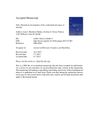Discovery of Clinically Approved Drugs Capable of Inhibiting SARS-CoV-2 In Vitro Infection Using a Phenotypic Screening Strategy and Network-Analysis to Predict Their Potential to Treat COVID-19
July 2020
in “
bioRxiv (Cold Spring Harbor Laboratory)
”

TLDR Four drugs were found that could potentially treat COVID-19 by inhibiting the virus in lab tests.
In 2021, a study was conducted to identify potential drugs that could inhibit SARS-CoV-2, the virus causing COVID-19, using a high content screening assay. Out of 65 compounds screened, four drugs were found to selectively inhibit SARS-CoV-2 in vitro infection: brequinar, abiraterone acetate, neomycin, and the extract of Hedera helix. Brequinar and abiraterone acetate showed higher inhibition potency against SARS-CoV-2 than neomycin and Hedera helix extract. Drugs with reported antiviral activity and in clinical trials for COVID-19, such as chloroquine, ivermectin, and nitazoxanide, were also included in the screening, but the last two were found to be non-selective. The study also used a data mining approach to build drug-host molecules-biological function-disease networks to provide a holistic view of how each compound is interconnected with host node molecules and virus infection, replication, inflammatory response, and cell apoptosis.



